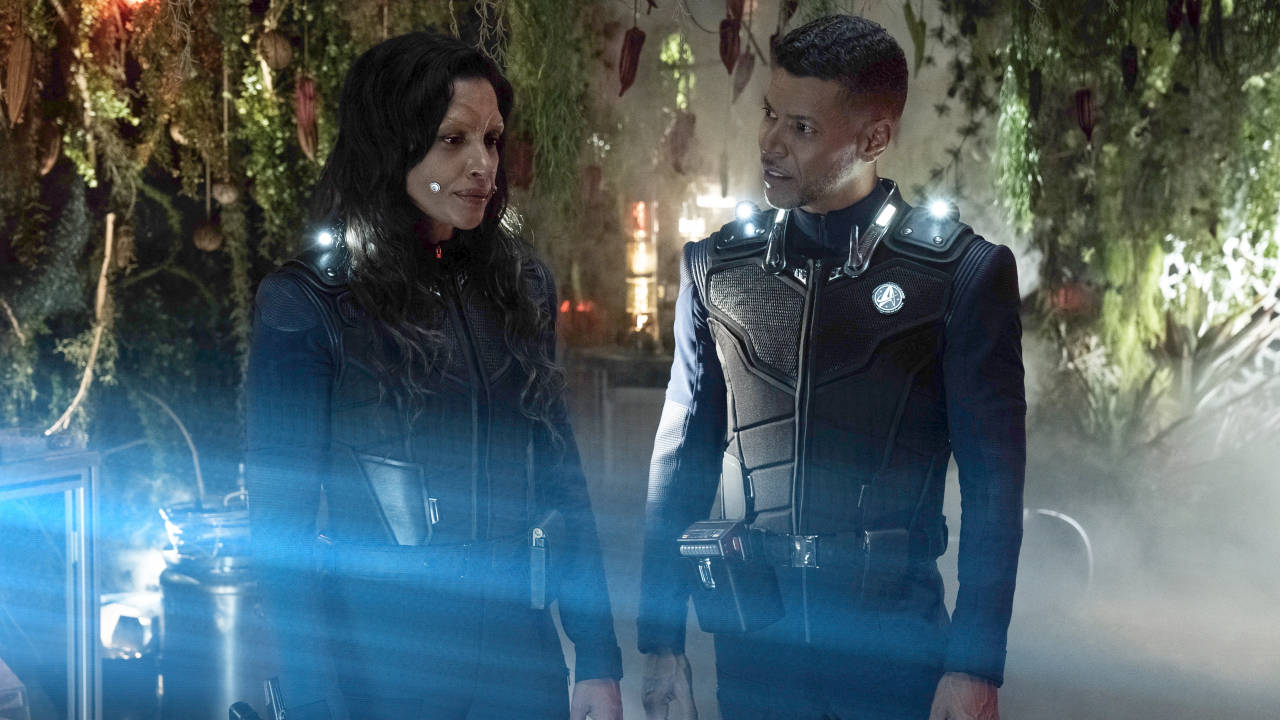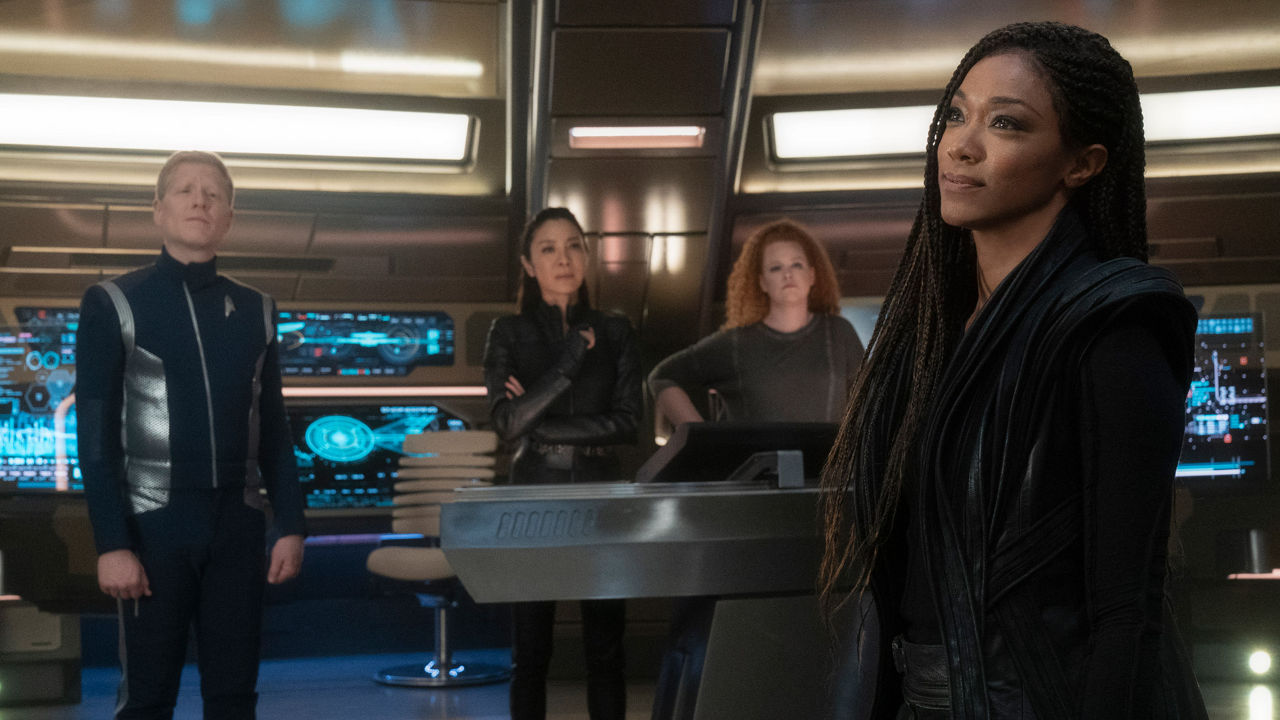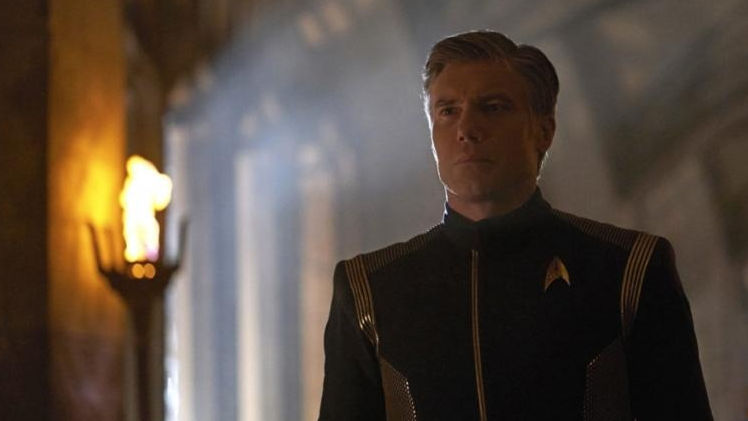Article Content
Star Trek: Discovery
Discovery returns to the fold

There’s a lot to unpack in the dense and ambitious "Die Trying," which is easily the best episode of the third season so far and among Discovery‘s best outings, and possibly its most balanced to date. This show tries to do a lot of things, and it ends up doing most of them very well. There’s promising stuff here.
If “Forget Me Not” was a good example of Discovery dialing it down and acting like classic Trek, "Die Trying" is more in line with Discovery‘s own true DNA. But it has figured out how to balance the formula and blend its more modern sensibilities with the classic ones. It does this in a story where Discovery reaches the 32nd-century joint Starfleet/Federation headquarters where they meet Admiral Charles Vance (Oded Fehr), who debriefs them on some current happenings, but has numerous questions for the crew of such an old ship.
Gone but not forgotten

"Forget Me Not" is a refreshingly, unusually quiet and introspective hour of Discovery that feels like it’s from a previous generation of Star Trek. It’s among the quietest and most character-driven episodes of the series. It’s perhaps not the most riveting episode of all time and it employs plenty of mystical alien mumbo-jumbo, but it’s very nicely done and sincere, and it benefits from a final revelation that’s truly intriguing — building on a concept previously explored by adding just a slight little spin on things that’s rather ingenious.
The episode takes us to the Trill homeworld, to see if they can help Adira — the only known successful example of a human joined with a Trill symbiont (I guess Riker in "The Host" doesn’t count because it was temporary) — recover the Tal symbiont’s memories, which are blocked from her. (These memories include those of Admiral Senna Tal, who may know where to find what remains of the Federation.) Indeed, Adira can’t remember how she even came to be joined with the symbiont in the first place.
There’s no place like home

"People of Earth" is an effective mix of emotions and well-paced starship-standoff action, and provides our first glimpse at what a familiar Federation locale — specifically Earth — looks like in the post-Federation 32nd century. It’s our first real attempt at world building within this third season. This is a step up from the first two outings, which felt like generic space westerns in terms of their storytelling. (Although, as space westerns go, they had nothing on this past weekend’s season premiere of The Mandalorian.)
This series wears its emotions on its sleeve, and Burnham’s reunion with the Discovery crew is milked for all the feels, and pretty effectively. Tilly reflects in a pretty good scene that having traveled forward in time means everyone they knew is now long dead; it’s good to see the story slow down to acknowledge what it means to be displaced permanently from your time. New Braided Chillax Burnham seems all about letting the past go, and indeed it at first seems questionable whether she will even rejoin the crew. She has a nice reunion with Saru, where kind words are exchanged and she relinquishes any ambitions she ever had to be captain. Like I said last week, Martin-Green’s performance is notably lighter with Burnham having now spent a year in this century as a courier. Even Tilly mentions the new air.
A fistful of dilithium

I’m so glad to learn the aesthetics of 19th-century saloons, complete with batwing doors, have survived into the 32nd century. That’s some staying power. And that bad guys come strolling into such saloons with an imposing swagger as the camera makes a point to show us their jangling boots before showing us their faces.
There’s a scene midway through "Far From Home" that screams out: Hey look! Space cowboys in a space western! At the risk of setting up an expectation where I will make one Andromeda reference per episode this season (don’t count on it), I couldn’t help but think of that series’ "Last Call at the Broken Hammer," which also had a futuristic saloon with batwing doors, albeit infinitely worse production values.
Star Trek arrives in the 32nd century

Few, if any, slate-clearing series reboots have been as extreme (or contrived) as Discovery‘s jump forward in time 931 years to the year 3188 in order to (deep breath) hide a cache of indestructible, self-aware data from an evil artificial intelligence whose acquisition of that data would mean certain galactic Armageddon. I mean, that is something. The writers either wanted to get as far away from the show’s original pre-TOS setting as possible, or they had some new things they wanted to explore in the very-far-flung future of the Trekkian universe. They clearly weren’t interested in a mild or middle-ground shakeup.
The brand-spankin’ new thing they apparently want to do is an official Star Trek remake of Gene Roddenberry’s Andromeda. (The premise of Andromeda’s post-Commonwealth fall was itself simply a way of telling a post-Federation story outside the actual Trek universe.) The news of the Federation’s fall is gradually revealed in "That Hope Is You, Part 1" an episode that arrives at the season’s new mission statement (let’s re-establish the Federation!) by the end of the episode but, on the whole, is a pretty unremarkable but okay hour. As slow-burn establishing material goes, this is average.
‘Discovery’ closes the loop

Well, they didn’t exactly stick the landing, but they were still standing by the end of it. This got the job done. And it was, let it be said, epic.
"Such Sweet Sorrow, Part 2" had a tall order before it: to fundamentally change the status quo of the series (implicitly promised by all the build-up and goodbyes in last week’s overly schmaltzy episode, which at least in context now feels slightly more valid) while trying to satisfactorily make sense of this season’s ongoing plot and character arcs. While they don’t completely overcome the dopiness of some of the ideas that have been swirling about for several episodes now, they do close as many loops as possible while bringing massive cinematic showmanship to this finale in a way that helps paper over some of the seams.
The importance of being earnest

"Such Sweet Sorrow," right down to its corny Shakespeare-quoting title, is an hour of extreme earnestness, featuring grand gestures of selflessness, last-minute family reunions, naked sentimentality, and lots of tearful goodbyes. I mean, they really laid it on thick here. Here’s an hour that slows down to acknowledge the character relationships, but is completely ham-fisted about it. I’ll also say this: There had better be a major shakeup of this series coming in next week’s season finale for this episode to have been remotely earned. Discovery — or at least Michael Burnham — had better be riding permanently off into the sunset of the distant future.
We left last week with the Enterprise en route to rescue the crew of the Discovery after it was decided the only way to destroy the sphere data and keep it out of Control’s hands was to auto-destruct the ship. Well, it turns out this plan also doesn’t work, because the data has now merged with Discovery‘s computer and has enough control of the ship to disarm the auto-destruct. It also raises its shields when the Enterprise starts firing torpedoes at it. So it’s back to the drawing board, with only an hour before Control’s Section 31 ships arrive.
Pike confronts his destiny

I’m finding the serial nature of Discovery — particularly the past few weeks where the episodes are more chapter-like with incremental arc progress than they are episodic standalones — is starting to make the reviewing process somewhat more tedious as we reach the end of the season. There are only so many ways I can say I was moderately entertained by an hour of sci-fi action-adventure while shrugging at the big picture because it’s deferred for yet another week.
But that’s the MO of this series. Advance the plot in mechanically incremental but not especially substantively groundbreaking ways (because we still have two episodes after this one). Deliver some decent dialogue scenes. Reveal a somewhat significant character insight. Have a major action set-piece. End on a cliffhanger that teases us for next week. This, as I say nearly every time, is adequately diverting. But it’s becoming considerably less interesting to write about as the season goes on. I’ve reached the point where I want to know what the destination is. The journey documenting Control’s desire to take over the galaxy has probably gone on long enough — and an evil AI devoid of any plausible motivation for its plan to wipe out all life is not particularly compelling as villains go.
Infinite timelines in infinite combinations

"Perpetual Infinity" is another frequently exciting episode of Action Thriller Trek that moves the season arc forward and is mostly sold on its sense of adrenaline, which continues to deliver admirably. But it also comes at a moment in the season when the arc begins supplying answers and tying together threads, and the big picture begins coming into focus. And I’m wondering how much of this is going to make sense by the end. The truth is, it probably doesn’t have to make very much sense because manipulating timelines means probably anything is possible.
There are some points here I’m confused about. I’d watch it again to clarify details, but I don’t have time in my schedule for that, and I don’t own a time-traveling suit to make more time. (Besides, I have doubts that a rewatch would necessarily clear things up.)
Struggle is pointless
 Control.
Control.Control. Control Control Control. Control, Control Control Control Control Control. Control Control Control Control Control; Control Control Control Control Control, Control Control. Control.
Control!
Control Control Control Control Control Control Control Control Control Control Control. Control Control Control Control Control Control Control, Control Control Control Control Control, Control Control Control Control Control Control Control Control. Control Control Control Control — Control Control Control Control Control Control — Control Control Control Control Control Control.
Control Control Control, Control Control Control Control Control Control Control. Control, Control Control Control Control. Control Control Control Control Control Control Control Control Control — Control Control Control Control Control.
Control Control Control Control Control Control. Control Control Control Control Control Control Control Control Control Control Control Control Control. Control Control Control Control, Control Control Control Control Control Control Control. Control Control Control Control, Control Control Control.
Can’t roll! Can’t roll! Cantroll! Control!
Hodor!
